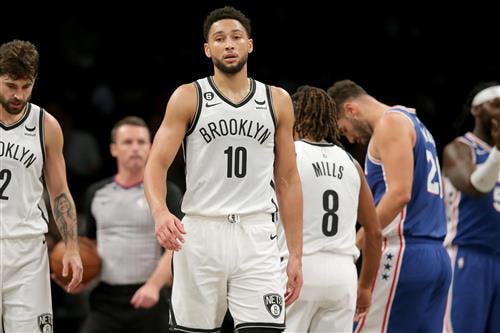
Imagine thinking there's any such thing as way-too-early 2023 NBA trade deadline predictions.
Remember how one moment, you're in the dead of summer, wondering how (and why) the Denver Nuggets managed to hash out a contract agreement with DeAndre Jordan 2.7 seconds into free agency? And then the next moment, your neighbors are putting up inflatable winter holiday decorations that billow in the wind like Kevin Durant's allegiance to the Brooklyn Nets?
The lead-up to the NBA trade deadline is a lot like that. One minute, you're wondering how long the Lauri Markkanen-era Utah Jazz dynasty will last. The next, you're glued to your Twitter feed hoping a report from the unverified, avatar-less @multiplesauces9 about Luka Doncic growing wary of playing in Christian Wood's shadow and requesting a trade is actually true.
This is all to say: Now is the time to fire off our trade-deadline predictions.
In the interest of maybe, potentially, possibly, actually getting a prediction correct, I've decided that any move before Feb. 10 at 3 p.m. EST falls under this umbrella. "Consequentially reasonable" will also be the theme of these crystal-ball gazings. I'm sticking to predictions about which you should give a damn but aren't senselessly nuclear.
To the Hall of Uniformed Prophecies we go!
The Action Will Start Earlier Than Normal
Dec. 15 is deemed the unofficially official start of "NBA Trade Season," since that's when a majority of the free agents who signed contracts over the summer can first be dealt. But this demarcation line is beyond arbitrary.
The lion's share of free agents from the previous offseason aren't actually jettisoned just because they're eligible. This waiting period is more about teams figuring out what they have and who they are overall and then letting the buyers and sellers market develop based off those results.
That delay won't exist this year. There will be more action in the months leading up to the deadline than we're typically used to seeing. They may not be blockbuster moves, but these moves also won't purely happen because the Los Angeles Lakers are currently imploding. (More on this in a second!)
Instead, we should expect prospective sellers to act with more haste. Especially those who are too inadvertently good to be deliberately awful.
Team CEO Danny Ainge will not stand for the Utah Jazz being within earshot of .500, let alone above it, for this long. The San Antonio Spurs were supposed to be the most organically bad team in the league; they won't let all this winning slide, either. Other sellers will emerge from the woodwork, including those looking to out-lose franchises dealing themselves closer to top-three lottery odds.
Frankly, we should also expect the buyers market to materialize even quicker, as well. This year's competitive landscape is duh-eep. Want-to-be contenders who might fall behind the field (Miami, Philadelphia, Denver, Minnesota) or title hopefuls who are good-but-not-quite-finished (Phoenix, Brooklyn) can't afford to lay in wait forever. There is no margin for error at the top or even inside the middle this year. Teams will pounce to make upgrades accordingly. I think.
Russell Westbrook Gets Jettisoned to Indiana or San Antonio
It is tempting to predict that Russell Westbrook won't be traded at all. The Los Angeles Lakers won't magically become title favorites if they move him and two firsts for Josh Richardson and Jakob Poeltl or Buddy Hield and Myles Turner. Their future selves might be better off riding it out with Russ or attempting to broker a buyout, taking their play-in-exit-or-worse medicine this season and recalibrating over the summer.
That's not happening. At least, it shouldn't. LeBron James is in his age-38 season and still really, really freaking good. Whether the Lakers have a plausible path to contention doesn't matter. They are obligated to act like they do, because LeBron (and Anthony Davis) exist. That calculus only changes if—*ferociously knocks on oakened mahogany*—one of the stars gets injured or if AD pulls a January 2019 and requests a trade. (Gasp at the latter if you must, but really munch on it and you'll have an AlonzoMourningNodding.gif epiphany.)
The Indiana Pacers and San Antonio Spurs loom as the most natural trade partners. Indiana is even less interested in the here and now than most Victor Wembanyama oglers, and San Antonio has nearly $30 million in cap space they can use to cushion the blow for the small-market Lakers front office.
I won't take a stab at predicting how much it costs for L.A. to ship out Russ. At least one first-round pick and swap feels like the bare minimum. He's on an expiring contract, but his salary is so gargantuan ($47.1 million) teams won't acquire him with the intention of rerouting him elsewhere. And any squad that's willing to stomach the money won't have any interest in actually keeping him. His contract effectively becomes dead money they must waive or buy out.
Determining which theoretical package the Lakers might prefer is a real thinker. A healthy Turner and engaged Hield gives them more of a nudge than Richardson and Poeltl. But a healthy Turner and engaged Hield are massive asks. The Spurs also have the ability to send out contracts that don't add money to the Lakers' 2023-24 books. That's huge. Los Angeles is on track for semi-significant cap space next summer and can't just bank on junking the final year and $19.3 million left on Hield's deal over the offseason.
Regardless, Westbrook will be traded. Which is good. Because the Lakers are bad. And he seems very unhappy. Ending this marriage that never should've taken place is best for everyone.